1839-45 William Kitson, Albion, Springs
1845-50 (William) George Pilbeam, Albion Inn, Springs/Cocked Hat
1851 Ann Pilbeam/Cole, Albion Inn, Cocked Hat
1851-53 John Cole, Albion Inn, Cocked Hat
1854-56 Samuel Thomas Story, Albion Inn, Cocked Hat Hill, Breadalbane
1856-58 Edward Davies, Albion Hotel, Breadalbane
1859?-66 Joseph Brown, Albion Hotel, Breadalbane
1866-68 Martha Allen, Albion Inn, Breadalbane
1868-9 Richard Barker, Albion Inn, Breadalbane
Prior to 1849, the Albion moved to a new building, as there was application for a license for the original building (see below, 9 May 1849).

The Courier, 6 April 1841

Cornwall Chronicle, 15 October 1842

Launceston Examiner, 18 January 1845
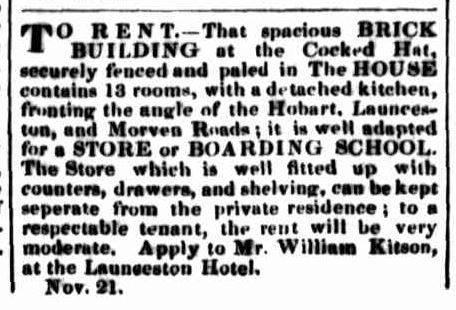
Launceston Examiner, 6 December 1845.
(This might be the older building?)
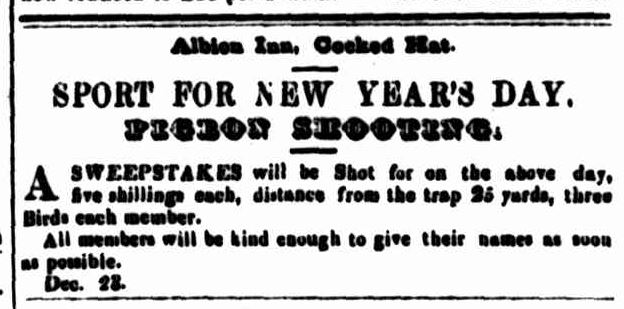
Cornwall Chronicle, 23 December 1846
From “Annual Licensing Meeting”:
William George Pilbeam, Albion Inn, Cocked Hat.No convictions, well conducted. Granted unanimously.
Launceston Examiner, 5 September 1846
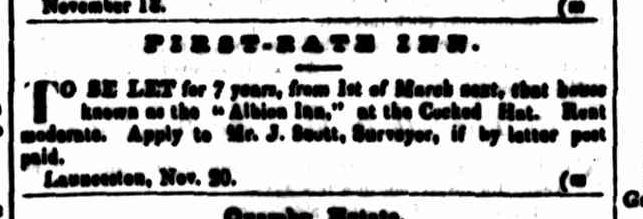
Cornwall Chronicle, 29 November 1848
BURGLARY & ROBBERY.–On Thursday night a burglary and robbery was committed at the Albion Inn, Cocked Hat. The thieves effected an entrance by a window at the rear of the premises, and ransacked several rooms with very great deliberation, finally talking away two watches, and other property to the value, altogether, of about £50.
Launceston Examiner, 25 March 1848
NEW APPLICATIONS.
Timothy Sullivan applied for a license at the Cocked Hat, district of Morven. The premises for which applicant applied were lately occupied by Mr. Pilbeam, but Mr. Pilbeam finding the premises inconvenient, obtained permission from Mr. Wales, the assistant P. M., to remove to an adjoining house. A letter was read from Mr. Wales addressed to the Court, recommending the application for this reason, among others that the police would have more control where there were two public houses, as it would prevent parties congregating at one house, &c.
Mr. Theodore Bartley objected to Mr. Wales’s views ; he thought the house occupied by Mr. Pilbeam quite sufficient, and that where a multiplicity of Licences were granted publicans were obliged to descend to artifices to draw custom ; applicants instead of waiting for the Annual meeting had got into the habit of trying to smuggle licences from the-quarterly meeting. He should upon principle oppose this application.
Mr. Rocher (for the applicant) stated, that the premises had been licensed for upwards of twenty years, (No no, from the bench, only 10 years 😉 well, for ten years ; it also belonged to an old colonist, Mr. Scott ; the license had been illegally removed by Mr. Wales ; the applicant came highly recommended. He would also call their attention to the extract of the Police Magistrate’s letter “I do not oppose a fresh license as the police can have more control over disorderly characters when there are two houses.” The premises had been efficiently repaired, and if the license was refused Mr. Scott would be a great loser.
Mr. Douglas in reply said he would put the matter simply before them ; the land originally belonged to Mr. Scott, who had not resided in the colony for many years, it was rented to Mr. Solomon, and by him sub-rented to Mr. Pilbeam, who had at a great expense erected the house to which he had lately removed. The argument used in favor of granting the license, was that the police would be more able to restrain gambling among the lower orders such as the “Devil among the tailors” “Ringing the bull,” &c. If such was the case, there were plenty of houses already, two at Franklin Village, and others situate on the line of road.
A long discussion now took place by the Justices as to the legality of Mr. Wales’ conduct with regard to removing Pilbeam’s license to his new house, but it was evident they did not understand the point in dispute — as indeed Mr. Bartley thought fit to admit afterwards. The fact was, Mr. Wales had exercised the right given to the Police Magistrate of the district, which, by way of refreshing their Worships’ memory, we extract from as follows :—
“XXI. — And be it further enacted that if any licensed person
“shall be desirous of removing his or her business to any other
“suitable and convenient premises in the same district and shall
“before removing procure a written approval and authority from
“the Police Magistrate of such district for the purpose then but
“not otherwise it shall be lawful for the said licensed person to
“remove accordingly an thing to the contrary notwithstanding.”
Mr. Wales had acted upon this authority ; had, in fact, done (as Assistant P.M.) what only the Police Magistrate of Launceston could do.
It being the opinion of the Court that a second house was not required at the Cocked Hat, Mr. Sullivan’s application was rejected. The point, with regard to Pilbeam’s house, remains as before.
Cornwall Chronicle, 9 May 1849

Death of William George Pilbeam (RGD 35/1/19 Deaths, District of Morven 1850 )

Cornwall Chronicle, 14 December 1850
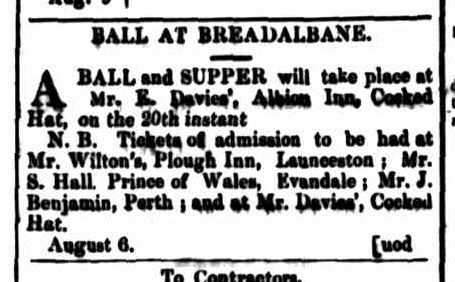
Cornwall Chronicle, 16 August 1856
The Bredalbane Annual Ball.— The third annual hall at the Albion Inn, will take place to-morrow evening. The ability, respectability, and liberality with which Mr. and Mrs. Davis conduct the balls at the Albion Inn are so widely known, that the residents in the surrounding districts will be gratified to learn that the third annual has been fixed for to-morrow evening.
Cornwall Chronicle, 16 June 1858
From “Town Talk and Table Chat”:
The application of Mrs. Martha Allen for transfer of the license of the Albion Hotel, Breadalbane, from Mr. Joseph Brown, was granted.
Cornwall Chronicle, 8 August 1866
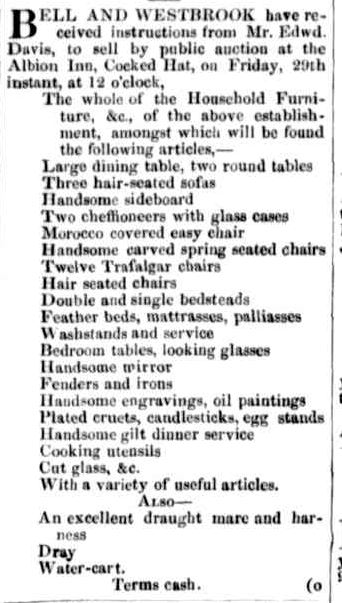
Launceston Examiner, October 1858
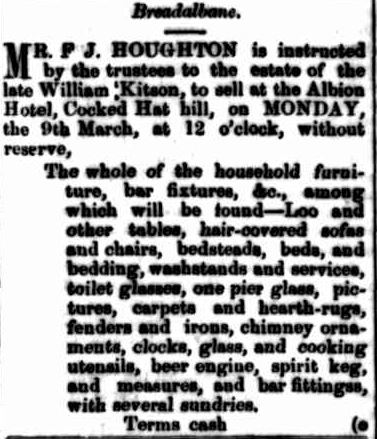
Launceston Examiner, 5 March 1868
From “Quarterly Licensing Meeting”:
ALBION INN, BREADALBANE
Application of Mr Richard Barker for a transfer of the Albion Inn, Breadalbane, from Mrs Martha Allen was granted.
Cornwall Chronicle, 5 August 1868
On reading the application of Mr. Joseph Brown, of the Cooked Hat, a very formidable opponent appeared in the shape of a man named Alcock, who resides somewhere between the Cocked Hat and Perth. This Mr. Alcock is that old correspondent of the Examiner, who, some ten or twelve years ago, was in the habit of writing letters of complaint against the Longford Police.
The grounds of opposition were — 1st. That one day when Mr. Alcock was passing Brown’s house, some very jovial fellow was at Brown’s door drunk, and what is of still greater importance, the man actually had a glass of liquor in his band at the time. 2nd. That some woman, whom Mr. Alcock had seen at Brown’s, was a harlot; and although he would not admit that he was himself able to prove the fact, he wished the Bench to believe that this same woman got her living by harlotry. That she was in the habit of stopping all night at Mr. Brown’s, and although he could not exactly prove it, he had seen her come out of the house in the morning -when she had gone in, Brother Alcock did not say. This part of the opposition was chiefly hear say. Some of the audience thought that poor old Alcock had met with a rebuff from the lady alluded to, and hence his vindictiveness. The 3rd charge against Mr. Brown, was that Brother Alcock’s nerves had been dreadfully shocked on having heard that Brown had attended a funeral at Perth, and on that solemn occasion, had got drunk ! And further, that Brown was in the habit of getting drunk, both at home and abroad. These charges the pious Alcock was not able to prove — all hearsay.
The Bench having listened to Alcock with great patience, after hearing the poor old man talk a great deal of silly nonsense, promised him that Mr. Brown should be cautioned, and so the matter ended. Mr. Brown, therefore, will be CAUTIONED !
Cornwall Chronicle, 5 December 1863
Larceny.-Mary Ann Townshend was found guilty of stealing a part of a bottle of brandy
from behind the bar at the Albion Inn, Breadalbane, the property of Richard Barker, and sentenced to two months hard labor.
Launceston Examiner, 26 January 1869
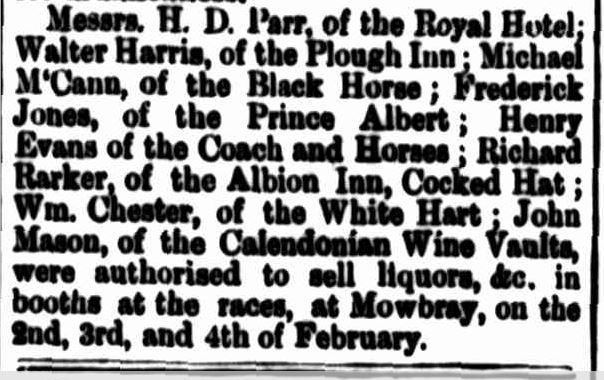
Cornwall Chronicle, 30 January 1869
General Sessions.— An adjourned Court of General Sessions was held at the Recorder’s Chambers, on Monday morning; present— J.Whitefoord, Esq. (Chairman); Thomas Mason Esq., P.M.; James Aikenhead, Henry Bennett, A. F. J. Bowen, John Crookes, and Robert DeLittle, Esquires, Justices of the Peace. Mr Smith, as Clerk of the Peace, said he had only received notice of one appeal, from Mr Richard Barker, and that had not been sent in time. Mr Mason said the ground of appeal in this case was that Mr Barker, who had kept the Albion Inn at Breadalbane, had purchased the Woolpack Inn since the decease of Mr Parkinson, shut up the Albion Inn, and now appealed and applied for a reduction of assessment, on the grounds that the Albion was no longer a public-house. The appeal, however, had been received too late, and if it had not it would have been inadmissible, as no alteration had been made In the amount of assessment at the last revision. The Chairman said in reality there was no business whatever before the Court, and it then rose.
Cornwall Chronicle, 16 February 1870
HISTORIC INN BURNT.
LAUNCESTON, Friday.
The historic building known to old residents as the Albion Inn, Breadalbane, which was a stopping place for the Page line of coaches between Launceston and Hobart in the early days, was destroyed by fire to-day. The building is associated with the bushranging days having at one period been the rendezvous for outlaws. It has, however, been unoccupied for some years past.
Daily Post, 9 March 1912
Breadalbane in the 30’s and 40’s of last century was a notorious district, and the two inns of the day, near the junction of the Hobart highway with the road to Evandale, had a reputation linked with bush rangers and sheep stealers.
…
History records that the Woolpack Inn was more than once a hide-out for bushrangers. Sheep stealers made it their headquarters too. On one occasion a nearby pigsty was found to have a false floor and beneath was quite a large space in which stolen sheep were found. Coaches to and from Launceston called at the Woolpack Inn and the nearby Albion Inn, while horses were watered at a handy waterhole.
Advocate, 16 November 1949